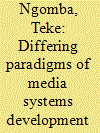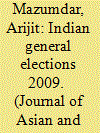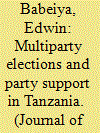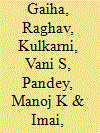|
|
|
Sort Order |
|
|
|
Items / Page
|
|
|
|
|
|
|
| Srl | Item |
| 1 |
ID:
110821


|
|
|
|
|
| Publication |
2012.
|
| Summary/Abstract |
This article addresses the emerging patterns of contemporary media-based engagements between China and Africa and argues, after an examination of current media systems in both China and Africa, that, despite expressed worries to the contrary, because of reasons spanning from history to geo-politics, the Chinese model of media system as it currently stands does not stand a chance, at least in the foreseeable future, to be exported to Africa - a continent whose current media landscape is, and will arguably remain, significantly Western-oriented. The article concludes with a call for scholars to exercise analytical restraint in their examination of the potential impacts of recent China-Africa media relations.
|
|
|
|
|
|
|
|
|
|
|
|
|
|
|
|
| 2 |
ID:
110822


|
|
|
|
|
| Publication |
2012.
|
| Summary/Abstract |
This article argues that the results of the Indian General Elections, 2009, emphasize continuity more than change. Regional political parties, local-level issues and identity-based politics remain significant. The verdict represents a confirmation of established patterns of electoral politics in India and not a break with the recent past.
|
|
|
|
|
|
|
|
|
|
|
|
|
|
|
|
| 3 |
ID:
110823


|
|
|
|
|
| Publication |
2012.
|
| Summary/Abstract |
Multiparty elections in Tanzania have been characterized by the dominance of the ruling party and the erratic rise and fall of opposition parties. This trend has been largely influenced by, among others, such factors as institutionalization, age, personality sex, history and low level of civic competence. However, the results of the 2010 general elections suggest a new development that challenges the eminence of the aforementioned factors, which have for almost two decades favoured the ruling party. This new development is reflected in the 2010 elections that witnessed some of the areas that were an enclave of the incumbent party offering a relatively strong support to opposition parties, particularly Chama Cha Demokrasia na Maendeleo (CHADEMA). The 2010 general elections' results prompt a need for an enquiry to establish whether or not this is the beginning of a new chapter in which both the ruling party and opposition parties stand an equal chance of winning the elections.
|
|
|
|
|
|
|
|
|
|
|
|
|
|
|
|
| 4 |
ID:
110818


|
|
|
|
|
| Publication |
2012.
|
| Summary/Abstract |
Despite accelerated growth there is pervasive hunger, child undernutrition and mortality in India. Our analysis focuses on their determinants. Raising living standards alone will not reduce hunger and undernutrition. Reduction of rural/urban disparities, income inequality, consumer price stabilization, and mothers' literacy all have roles of varying importance in different nutrition indicators. Somewhat surprisingly, public distribution system (PDS) do not have a significant effect on any of them. Generally, child undernutrition and mortality rise with poverty. Our analysis confirms that media exposure triggers public action, and helps avert child undernutrition and mortality. Drastic reduction of economic inequality is in fact key to averting child mortality, conditional upon a drastic reordering of social and economic arrangements.
|
|
|
|
|
|
|
|
|
|
|
|
|
|
|
|
| 5 |
ID:
110820


|
|
|
|
|
| Publication |
2012.
|
| Summary/Abstract |
Based on household food security surveys conducted in Ethiopia, this study seeks to understand the roles and limitations of income transfer projects as determinants of households' food security. By covering the Food-For-Work Programs (FFWPs) and the Productive Safety Net Programs (PSNPs), the study shows that these programs served as temporary safety nets for food availability, but they were limited in boosting the dietary diversity of households and their coping strategies. Households which participated in the programs increased their supply of food as a temporary buffer to seasonal asset depletion. However, participation in the programs was marred by inclusion error (food-secure households were included) and exclusion error (food-insecure households were excluded). Income transfer projects alone were not robust determinants of household food security. Rather, socio-demographic variables of education and family size as well as agricultural input of land size were found to be significant in accounting for changes in households' food security. The programs in the research sites were funded through foreign aid, and the findings of the study imply the need to reexamine the approaches adopted by bilateral donors in allocating aid to Ethiopia. At the same time the study underscores the need to improve domestic policy framework in terms of engendering rural local institutional participation in project management.
|
|
|
|
|
|
|
|
|
|
|
|
|
|
|
|
| 6 |
ID:
110819


|
|
|
|
|
| Publication |
2012.
|
| Summary/Abstract |
At the beginning of the 1980s, a group of left intellectuals and activists sought to press the then-exiled African National Congress (ANC) to adopt a change of strategy which would have given priority to the organized collective action of workers and the poor: they were expelled and their proposed remedies ignored. But, while it had little impact on political practice at the time, the implied debate between the dissidents and the ANC raised issues crucial to understanding the challenges which face South African democracy today. Although the dissidents' approach was based on a flawed analysis of the processes which produce social change, it did highlight an aspect of anti-apartheid resistance strategy which has made achieving a more egalitarian and democratic South African more difficult.
|
|
|
|
|
|
|
|
|
|
|
|
|
|
|
|
| 7 |
ID:
110824


|
|
|
|
|
| Publication |
2012.
|
| Summary/Abstract |
This paper critically evaluates the popular representation of rural decision making in India as guided by socio-cultural dynamics and as a resort from various social alignments. It investigates how decisions get taken about a decentralized governance scheme in rural India, what variables impact these decisions - namely, social, political, administrative or economic - and how these variables impact the scheme performance. Case studies and empirical analysis of performance of a decentralized welfare scheme in India, the Andhra Pradesh Rural Employment Guarantee Scheme (APREGS), demonstrates significant influence of agriculture-based economic dynamics and administrative efficiency factors. Local social hierarchies and cultural complexities do not come as the main concerns. These results challenge the traditional understanding of rural dynamics as totally controlled by caste hierarchies and authority of the large land owners and are discussed in the light of the institutional rational choice framework proposed by Elinor Ostrom. The results also call for a fresh and wider debate of whether India is witnessing a longer term indirect developmental outcome of empowerment which actively started in 1993 with the recognition of local governance systems (Panchayati Raj) as a formal democratic body.
|
|
|
|
|
|
|
|
|
|
|
|
|
|
|
|
|
|
|
|
|